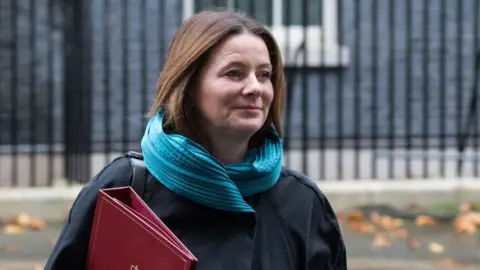NEU teacher strikes to go ahead after last-ditch talks fail
 Getty Images
Getty ImagesTeachers' strikes in England and Wales are to go ahead, after talks between the government and unions ended without resolution.
The National Education Union said Education Secretary Gillian Keegan had "squandered an opportunity" to avoid Wednesday's strike action.
It expects about 23,000 schools to be affected in the first of its seven planned walkouts.
Ms Keegan said she was disappointed the strike action would continue.
NEU joint general secretaries Dr Mary Bousted and Kevin Courtney said the government had been "unwilling to seriously engage with the causes of strike action".
They are demanding a "fully funded, above-inflation pay rise for teachers".
National Association of Head Teachers general secretary Paul Whiteman said the meeting had been "unproductive" as the secretary of state "was unable to make any offer on the eve of industrial action".
Further talks were expected, he added.
Ms Keegan said the strikes would have "a significant impact on children's education, especially following the disruption of the past two years".
She said unions did not need to strike to meet her - and with talks continuing, it was clear the strikes were "not being used as a last resort".
She reiterated a call for teachers to inform school heads if they intended to strike, in order to avoid "unnecessary disruption", and to ensure safety for children.
But she acknowledged that teachers had no obligation to do so. The NEU has advised its members to ignore the request.
The government is keen that schools remain open during Wednesday's walkout - although this will ultimately be decided by each headteacher.
More than 100,000 teachers are expected to strike, with industrial action expected on the same day from train drivers, university staff, and civil servants.
Speaking to the Sunday with Laura Kuenssberg programme, Labour's shadow education secretary refused to say whether teachers should go on strike.
Bridget Phillipson criticised ministers for failing to be "serious" in negotiating, citing the "disruption" the strikes would cause so soon after pupils' education was hit by the pandemic.
Although Wednesday's action is limited to England and Wales, walkouts are planned across the whole UK by the NEU and other unions.
Strikes in Scotland are continuing, as part of a 16-day programme.
Teacher salaries in England fell by an average of 11% in real terms between 2010 and 2022, after taking rising prices into account, says the Institute for Fiscal Studies.
Most state-school teachers in England and Wales received a 5% pay rise in 2022.
In Northern Ireland, many teachers were offered 3.2% for 2021/22 and 2022/23. In Scotland, teachers have rejected both a 5% increase and a more recent offer of up to 6.85%.
Ms Keegan says the government has provided an extra £2bn in school funding, insisting that this meets union demands.

Are you a teacher striking? Or a parent of a child affected? Get in touch by emailing [email protected].
Please include a contact number if you are willing to speak to a BBC journalist. You can also get in touch in the following ways:
- WhatsApp: +44 7756 165803
- Tweet: @BBC_HaveYourSay
- Upload pictures or video
- Please read our terms & conditions and privacy policy
If you are reading this page and can't see the form you will need to visit the mobile version of the BBC website to submit your question or comment or you can email us at [email protected]. Please include your name, age and location with any submission.
